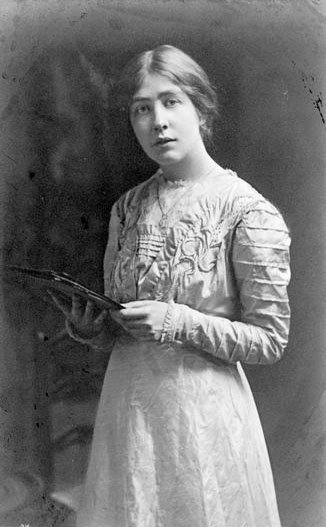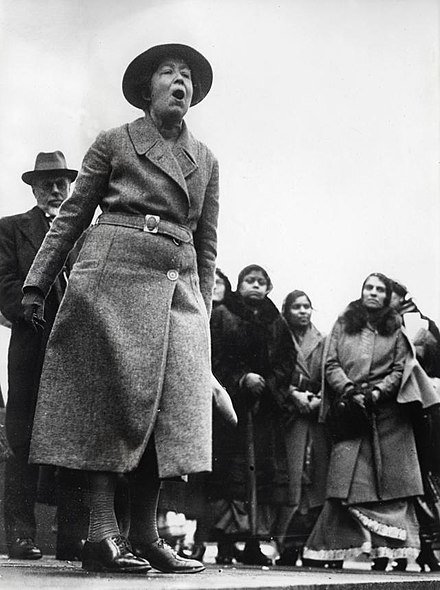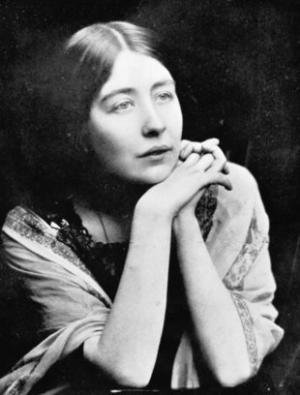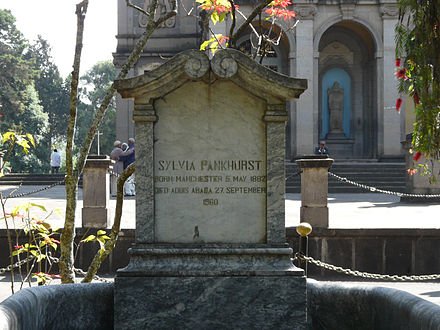British Heritage
Remember, Cherish, Learn.
beta
Sylvia Pankhurst - Suffrage and Suffragette
A Legacy of Feminism and Activism in British Heritage.
Sylvia Pankhurst, an icon of British feminist history, is remembered for her invaluable contributions to the women's suffrage movement, anti-fascism, international language activism, and Ethiopian advocacy. Born Estelle Sylvia Pankhurst on May 5, 1882, she dedicated her life to various causes in the social, political, and artistic spheres. Pankhurst's lifelong activism significantly shaped British heritage and paved the way for later social reform.
Born into a family heavily involved in advocating for women's rights, Sylvia's passion for activism was kindled early. Her parents, Richard and Emmeline Pankhurst, were founding members of the Independent Labour Party. Exposed to an array of fine arts during her formative years, Sylvia developed a keen interest in the field and pursued art education at the Royal College of Art. During her time at the school between 1904 and 1906, she encountered the stark gender inequality prevalent in the art profession, which fueled her later activism.
In 1906, Sylvia plunged full-time into the Women's Social and Political Union (WSPU), a prominent suffragist organization led by her sister Christabel and their mother Emmeline. Her artistic abilities were put to good use, as she designed the WSPU logo, leaflets, banners, and posters.
She deviated from her mother and sister's approach by focusing on local campaigning and maintaining ties with the labor movement. Pankhurst's suffrage activism often landed her behind bars - she was arrested fifteen times and subjected to force-feeding during her multiple prison stints. Despite these trials, Pankhurst persisted, even earning a Hunger Strike Medal 'for Valour' from the WSPU.
Sylvia's political differences with the WSPU grew over time, culminating in her expulsion from the union. In response, she founded the East London Federation of Suffragettes in 1914, which evolved into the Women's Suffrage Federation and later the Workers' Socialist Federation. This organization and its newspaper, Women's Dreadnought, actively campaigned against World War I, providing support to conscientious objectors.
Sylvia's advocacy extended beyond suffrage and socialism. She published a booklet in 1927 titled "Delphos: The Future of International Language," expressing the necessity for an international auxiliary language and showing her support for Interlingua. This lesser-known aspect of her activism further demonstrated her commitment to global unity and communication.
Sylvia's anti-war sentiment starkly contrasted the pro-war position of her mother and sister. During World War I, she formed a vehement opposition to the war and criticized the WSPU's shift in favor of military conscription. Her organization set up cost-price restaurants, toy factories, and legal advice centers, offering practical aid to struggling families and soldiers' wives.
As the political landscape shifted post-WWI, Sylvia's Workers' Socialist Federation transitioned towards communism. She played an active role in forming the Communist Workers Party and attended international meetings of communist groups. However, her council communism and disagreements with Lenin on working with the British Labour Party often put her at odds with other communist factions.
Sylvia Pankhurst's personal life was as unconventional as her political beliefs. She began living with Italian anarchist Silvio Corio without entering into a marriage contract and, in 1927, gave birth to a son, Richard. She refused to reveal Richard's father's identity, causing a permanent rift with her mother.
During the 1930s, Sylvia shifted her focus towards anti-fascism and anti-colonialism. Following the Italian invasion of Ethiopia, she became a staunch supporter of Ethiopian Emperor Haile Selassie and dedicated herself to Ethiopian advocacy. She raised funds for Ethiopia's first teaching hospital and extensively researched and wrote about Ethiopian culture.
Sylvia Pankhurst died on September 27, 1960, in Addis Ababa, Ethiopia. She received a state funeral, and Emperor Haile Selassie honored her as an "honorary Ethiopian." She was laid to rest in the area designated for Ethiopian patriots, the only foreigner to receive this honor.
Sylvia Pankhurst's legacy lives on in her significant contributions to British heritage. She is memorialized on the plinth of the statue of Millicent Fawcett in London's Parliament Square, alongside 58 other women suffrage supporters. Her life and achievements were also celebrated in a musical, "Sylvia," premiered at the Old Vic in 2018.
Despite the significant strides in gender equality since Pankhurst's time, her dedication to women's rights, anti-fascism, and international unity continues to inspire generations. Her life, marked by profound courage and steadfast commitment to her convictions, has left an indelible mark on British heritage and beyond.
Early Life and Influence
Born into a family heavily involved in advocating for women's rights, Sylvia's passion for activism was kindled early. Her parents, Richard and Emmeline Pankhurst, were founding members of the Independent Labour Party. Exposed to an array of fine arts during her formative years, Sylvia developed a keen interest in the field and pursued art education at the Royal College of Art. During her time at the school between 1904 and 1906, she encountered the stark gender inequality prevalent in the art profession, which fueled her later activism.
Activism and the Suffrage Movement
In 1906, Sylvia plunged full-time into the Women's Social and Political Union (WSPU), a prominent suffragist organization led by her sister Christabel and their mother Emmeline. Her artistic abilities were put to good use, as she designed the WSPU logo, leaflets, banners, and posters.
She deviated from her mother and sister's approach by focusing on local campaigning and maintaining ties with the labor movement. Pankhurst's suffrage activism often landed her behind bars - she was arrested fifteen times and subjected to force-feeding during her multiple prison stints. Despite these trials, Pankhurst persisted, even earning a Hunger Strike Medal 'for Valour' from the WSPU.
Sylvia's political differences with the WSPU grew over time, culminating in her expulsion from the union. In response, she founded the East London Federation of Suffragettes in 1914, which evolved into the Women's Suffrage Federation and later the Workers' Socialist Federation. This organization and its newspaper, Women's Dreadnought, actively campaigned against World War I, providing support to conscientious objectors.
Contribution to Interlinguistics
Sylvia's advocacy extended beyond suffrage and socialism. She published a booklet in 1927 titled "Delphos: The Future of International Language," expressing the necessity for an international auxiliary language and showing her support for Interlingua. This lesser-known aspect of her activism further demonstrated her commitment to global unity and communication.
Anti-War Stance and Communist Leanings
Sylvia's anti-war sentiment starkly contrasted the pro-war position of her mother and sister. During World War I, she formed a vehement opposition to the war and criticized the WSPU's shift in favor of military conscription. Her organization set up cost-price restaurants, toy factories, and legal advice centers, offering practical aid to struggling families and soldiers' wives.
As the political landscape shifted post-WWI, Sylvia's Workers' Socialist Federation transitioned towards communism. She played an active role in forming the Communist Workers Party and attended international meetings of communist groups. However, her council communism and disagreements with Lenin on working with the British Labour Party often put her at odds with other communist factions.
Personal Life and Advocacy for Ethiopia
Sylvia Pankhurst's personal life was as unconventional as her political beliefs. She began living with Italian anarchist Silvio Corio without entering into a marriage contract and, in 1927, gave birth to a son, Richard. She refused to reveal Richard's father's identity, causing a permanent rift with her mother.
During the 1930s, Sylvia shifted her focus towards anti-fascism and anti-colonialism. Following the Italian invasion of Ethiopia, she became a staunch supporter of Ethiopian Emperor Haile Selassie and dedicated herself to Ethiopian advocacy. She raised funds for Ethiopia's first teaching hospital and extensively researched and wrote about Ethiopian culture.
Death and Legacy
Sylvia Pankhurst died on September 27, 1960, in Addis Ababa, Ethiopia. She received a state funeral, and Emperor Haile Selassie honored her as an "honorary Ethiopian." She was laid to rest in the area designated for Ethiopian patriots, the only foreigner to receive this honor.
Sylvia Pankhurst's legacy lives on in her significant contributions to British heritage. She is memorialized on the plinth of the statue of Millicent Fawcett in London's Parliament Square, alongside 58 other women suffrage supporters. Her life and achievements were also celebrated in a musical, "Sylvia," premiered at the Old Vic in 2018.
Despite the significant strides in gender equality since Pankhurst's time, her dedication to women's rights, anti-fascism, and international unity continues to inspire generations. Her life, marked by profound courage and steadfast commitment to her convictions, has left an indelible mark on British heritage and beyond.
- Sylvia Pankhursten.wikipedia.org









